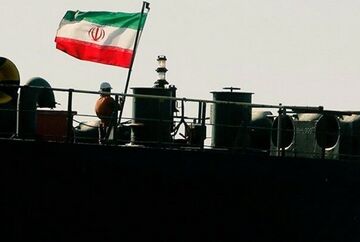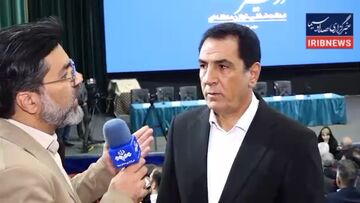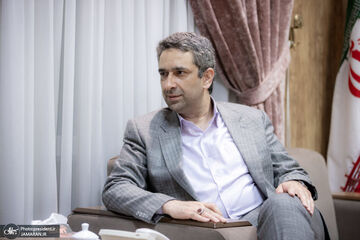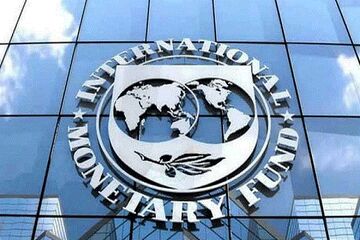TEHRAN(Bazaar) – Former UK conservative government minister says “China’s approach to economic development has geopolitical consequences, especially in its international engagement, such as “One belt One road”, as well as its subsidies of state champions going global.”
“The core problem is that China tries to “impose” its OBR,” Lord O'Neill tells the Bazaar in an exclusive interview.
Lord Terence James O'Neill, Baron O'Neill of Gatley is a British economist best known for coining BRICs, the acronym that stands for Brazil, Russia, India, and China—the four rapidly developing countries that have come to symbolise the shift in global economic power away from the developed G7 economies. He is also a former chairman of Goldman Sachs Asset Management and former Conservative government minister. As of January 2014, he is an Honorary Professor of Economics at the University of Manchester. He was appointed Commercial Secretary to the Treasury in the Second Cameron Ministry, a position he held until his resignation on 23 September 2016. He chaired the UK's Independent Review into Antimicrobial Resistance for two years, which completed its work in May 2016. Since 2008, he has written monthly columns for international media organization Project Syndicate. He is the current chairman of the Council of Chatham House, the Royal Institute of International Affairs. He is also member of House of Lords of the United Kingdom since 2015.
Following is the full text of the interview:
Bazaar: In foreign policy, China focuses on economic development. Meanwhile, the United States is trying to involve China in geopolitical conflicts. Do you think America will be able to do that?
Lord O'Neill: I suspect it is more complicated than this! China’s approach to economic development has geopolitical consequences, especially in its international engagement, such as “One belt One road”, as well as its subsidies of state champions going global. So, its development takes it, into geopolitical conflict even when it isn’t consciously pursuing conflict. And of course, most of the time, the US sees the world in a democratic, US kind of way.
Bazaar: The important argument about China's economic development is that, contrary to the liberal model, it has achieved economic development without following the path of political development. Some believe that China will face serious problems in the future due to the lack of political development, and that the demands of the Chinese people will enter the phase of political development. What is your prediction?
Lord O'Neill: I wrote something around this topic for project syndicate last month. I think China has a challenge now, more than the last 30 years. its domestic labour force is peaking in terms of growth, and this makes economic growth harder, and more dependent on productivity. To achieve its aim of doubling GDP and incomes over the next 15 years, it can’t afford to have multiple sources of confrontation with the rest of the world, as it will reduce any productivity contributions it might harness through trade and investment. So, China has to think carefully, perhaps be a bit more imaginative.
Bazaar: At a recent g7 summit, western leaders approved a budget to encourage developing countries to trade with the west and keep them away from China. Can this solution hinder China’s “One belt-One road” project?
Lord O'Neill: I am not sure how serious is the new g7 commitment to their version of one belt one road, I don’t see any sign of it being a true priority, other than perhaps to signal there is an alternative to China’s OBR. on the OBR itself, this symbolises what I said above. I think most Chinese officials would, at least, privately, admit that the first stage of OBR didn’t really succeed, other than getting a lot of media attention and awareness. Many countries have reacted unfavorably. I think the core problem is that China tries to “impose” its OBR. if it really wants success and for it to be embraced, it should invite other countries to help shape it. Indeed, for at least 4 years, I have proposed that China should specifically invite its huge neighbour, India, to help develop it further, as otherwise, India itself, won’t probably ever be interested. This is not a great sign. China needs to apply its global approach more imaginitely.
Bazaar: Russia's new security doctrine has an important role to play in relations with China. Given the cooperation between the two countries, it seems that Russia and China, despite some disagreements, are deepening relations with each other, especially regarding the “One belt-One road” project. The agreement on the passage of some important corridors of this project through the northern route (Russia) is evaluated in this regard. Will we see the polarization of the world based on trade and economic zones? In the sense that on the one hand Russia and China and their allies and on the other hand the west and its allies?
Lord O'Neill: The attraction of the northern route of OBR to Russia is obvious, given Russia’s own problems with the west. As to whether this makes a big difference beyond their own borders and immediate surrounding countries, is another matter. Russia itself, has big economic problems, with very poor demographics and seemingly unable to reform its internal economy and excessive dependency on energy resources. So, yes, co-operation with China is very attractive to them, to a degree, but I am not sure it is that big a global issue.
Bazaar: China has trade and economic relations with about 130 countries and the United States with about 80 countries. and China is implementing the “One belt-One road” project. Will the dependence of these countries lead to the formation of a kind of Chinese order at the level of international order?
Lord O'Neill: I think to some degree, this has already happened, as China has become no 1 trade partner for so many countries. But this doesn’t translate into a new – clear- international order. For China to truly shape the global institutions and with it, the global order, it needs to somehow navigate and offer leading contributions to global organisations without having to depend excessively on instructions from the party leadership back in Beijing.
Interview by Javad Heiran-Nia















نظر شما